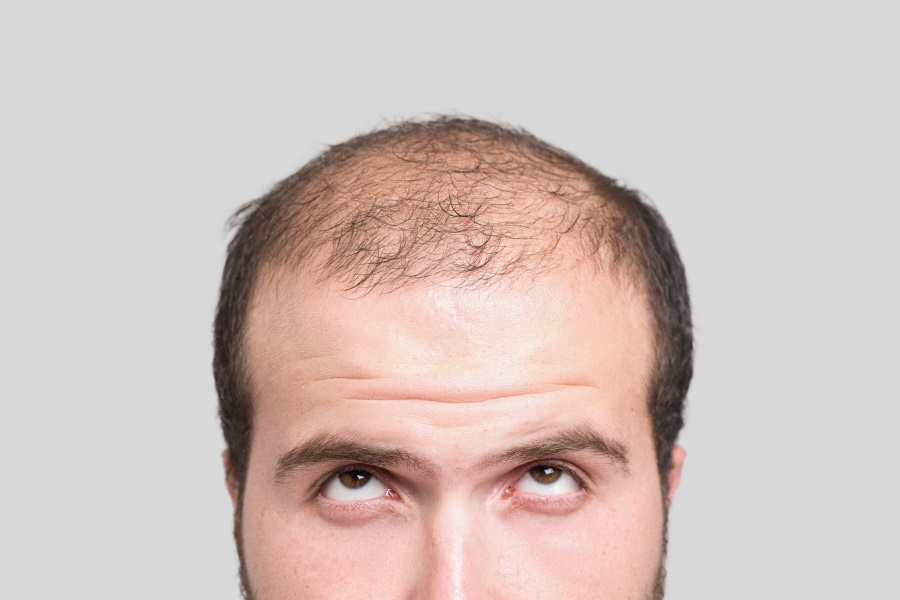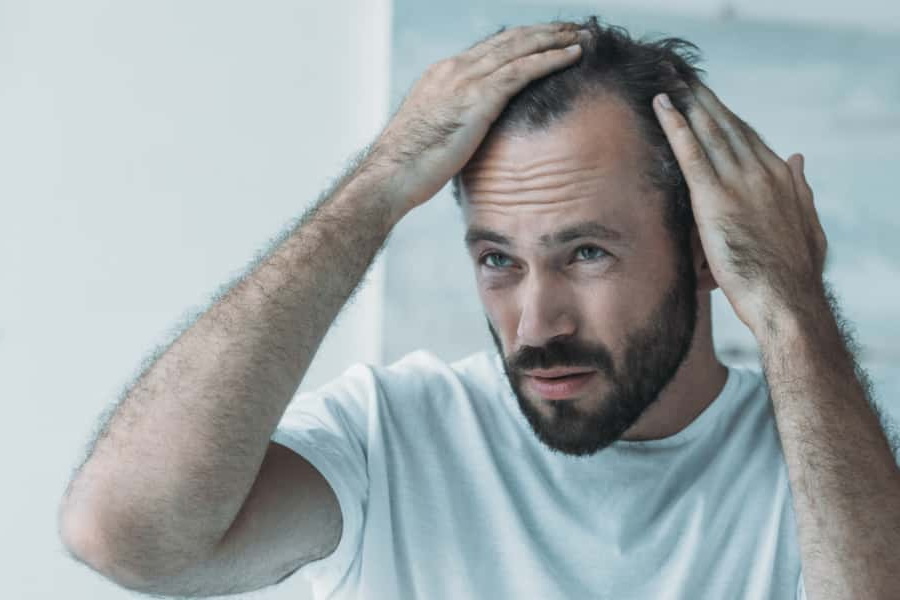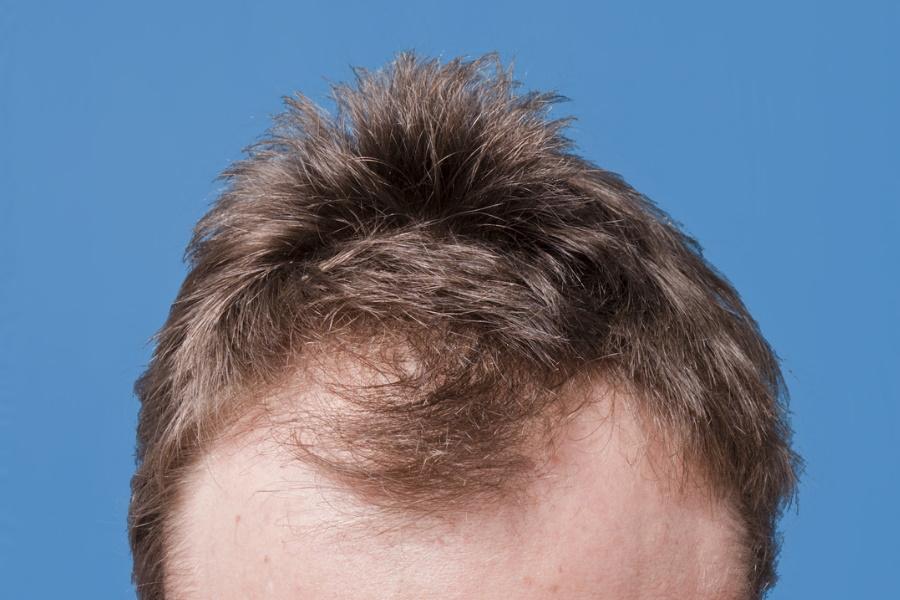
Published:
Readtime: 10 min
Every product is carefully selected by our editors and experts. If you buy from a link, we may earn a commission. Learn more. For more information on how we test products, click here.
For men suffering from hair loss, causes range from hereditary traits to underlying medical conditions to lifestyle choices and more. Should you notice a receding hairline or thinning hair at the crown of your head, the first thing to remember is that you’re far from alone. In fact, studies suggest that approximately 85% of men experience significantly thinning hair by the age of 50. Nevertheless, you might still be wondering: what causes baldness in the first place? Here’s everything you need to know.
You’ll also like:
How Wayne Carey Regrew a Full Head of Hair with Mosh

What is Hair Loss?
As it turns out, both men and women experience hair loss every day (about 100 or so hairs, in fact). However, when you have a healthy head of hair, old hairs are quickly replaced by new ones. As a result, you don’t notice thinning hair at the crown or other signs of male baldness. Naturally, we’re not referring to this process when we use the term “hair loss” in the general sense. That’s because actual hair loss occurs when the cycle of regrowth gets disrupted and the follicle is damaged beyond repair.
Another word for hair loss is alopecia and it can take various forms, affecting just your scalp or occasionally removing all the hair from your body. The most typical type of alopecia amongst men is male pattern baldness and it accounts for about 95% of hair loss. If you notice thinning at the crown, male pattern baldness is the most likely culprit. However, if there are patches of hair falling out of your beard or other areas, you might have a more serious type of alopecia.

Hair Loss Symptoms
The symptoms of hair loss might sound obvious enough, but they’re actually broader than one might expect. Depending on the cause, men’s hair loss can come suddenly or take its sweet time. Furthermore, some hair loss is fleeting while other types are permanent.
Ultimately, it’s important to acquaint yourself with the different symptoms of men’s hair loss and male pattern baldness. After all, there’s no harm in being prepared. Here are some examples:
1. Gradual Thinning of Hair at the Crown
What begins as a receding hairline becomes thinning hair at the crown of your head, typically indicating male pattern baldness. This is the most common type of hair loss.
2. Patchy Bald Spots
While most male pattern baldness takes a uniform progression, some men experience random patches of circular bald spots. In more severe cases of alopecia, the hair loss extends beyond the scalp to areas such as the eyebrows or beard. Sometimes, the onset of hair loss is preceded by itchy or irritated skin.
3. Sudden Onset of Loose Follicles
A traumatic event or abrupt physical change can create a shock to the system, causing hair loss. In this scenario, the hair loosens at the root and comes out in clumps when you comb, wash, or gently pull on it.
4. Full Body Hair Loss
When you undergo certain medical treatments such as chemotherapy, you might experience temporary hair loss all over your body. Severe cases of alopecia (aka alopecia universalis) can cause full-body hair loss as well.
5. Irritated Scalp
If your scalp is showing harsh signs of irritation like scaling or swellness, hair loss can often follow. An underlying condition such as ringworm might be the culprit so you should see a doctor immediately.

6 Top Hair Loss Causes
For the majority of adult males, hair loss is more or less a fact of life. That’s because genetics play the biggest role and by a fairly wide margin. However, don’t take that to mean there aren’t other factors to consider. Here are 6 common hair loss causes in men.
1. Hereditary Traits
What causes baldness? You ask. The answer is most often your ancestors. Indeed, a family history of hair loss doesn’t bode well for your follicles as you age.
2. Underlying Medical Conditions
Certain medical conditions such as ringworm or thyroid disease can upset your hormonal balance and lead to sudden hair loss as a result. Some diseases (such as specific types of lupus) can create scarring on the scalp, thereby enabling permanent hair loss.
Conditions such as diabetes can damage the immune system, leading to hair loss causes like alopecia areata. There’s also a hair-pulling disorder known as trichotillomania, which can yield temporary balding (presuming the follicles aren’t damaged).
3. Medications and Treatments
Certain types of medications and treatments include hair loss as a potential side effect. That includes medications for diseases or conditions such as cancer, high blood pressure, arthritis, depression, and heart problems. Radiation therapy (chemotherapy, etc) has long been associated with hair loss.
4. Extreme Stress
In the wake of a physical shock or traumatic event, many people experience temporary hair loss. This is essentially due to the relationship between stress and hormone production.
5. Lifestyle Choices
Diets lacking in protein, iron, and key vitamins and nutrients have been linked to thinning hair, while smoking has been purported to accelerate the symptoms of male pattern baldness. According to some studies, both excessive weight gain and rapid weight loss can produce certain deficiencies, thereby causing hair loss.
6. Improper Haircare
If you employ a hairstyle that consistently pulls at the roots (pigtails, cornrows, etc), it can lead to a hair loss cause known as traction alopecia. Should your bleaching routine or hot oil hair treatment inflame or damage the follicles, that can likewise generate hair loss.

Hair Loss Risk Factors
In some cases, male pattern baldness is basically inevitable. However, that’s not true for every individual. As such, it’s important to familiarise yourself with the most common risk factors. Here they are.
1. Family History
If your relatives (particularly on your mother’s side) have male pattern baldness, there’s a good chance you’ll experience it as well.
2. Age
The older you get, the more likely it is that you’ll join the majority of men who have thinning hair at the crown of their heads or show other signs of male baldness. This could be the result of hormonal changes or inherited traits or both at the same time.
3. Extreme Fluctuations in Weight
Sudden and extreme weight loss or weight gain is generally bad for your body and, furthermore, indicative of poor lifestyle choices. If you’re overweight, there’s no harm in shedding some pounds, but don’t do it by depriving yourself of much-needed nutrients, vitamins, minerals, or amino acids.
4. Medications
Your body responds to certain medications differently than others. If you’re experiencing sudden hair loss as a side effect, talk to your doctor about seeking an alternative medication.
5. Stress
Stress manifests itself in all sorts of ways, including hair loss. For that reason, increased amounts of stress represent a risk factor.

Prevention of Hair Loss
Being that the majority of hair loss causes are genetic in nature, one might look at it as an unavoidable condition. While that’s true to an extent, there are measures you can take to slow down the process of alopecia. It’s also important to remember that not all hair loss is the result of an inherited trait, making certain measures that much more important. Here’s what you can do to prevent hair loss.
1. Use Hair Loss Treatment
The two most popular hair loss treatments (also known as hair growth treatments) are Minoxidil and Finasteride. You probably know these medications by popular brand names such as Rogaine (Minoxidil) and Propecia (Finasteride).
You can get Minoxidil over-the-counter and it usually comes as either a foam or a liquid. Finasteride requires a fairly easy-to-obtain prescription and comes in pill form. While both these treatments work differently, they’ve been directly linked with preventing hair loss and even promoting regrowth in certain users.
Should you take Finasteride, be advised that it can be three months (if not longer) before you see results. Also, it’s a prescribed medication and that means you could experience potential side effects such as depression, itchiness, impotence, and more. Please consult with your personal doctor before taking this drug.
View the 15+ Best Hair Loss Treatments for Men to Beat the Bald Spot
2. Proper Haircare
If you’re abusing your hair on a regular basis and noticing hair loss, these two things could very well be correlated. Ease up on the braids or the bleaching or the hot oil treatments or the curling irons and see what happens. Also, try to keep your hair out of the sun or other sources of ultraviolet light for extended periods of time.
3. Lifestyle Changes
Try to avoid making lifestyle choices that can lead to malnutrition or heavy amounts of stress, as both have been cited as hair loss causes. Don’t hesitate to consult with a therapist, who can help steer you away from stressful triggers. And while you’re at it: stop smoking!
4. Hair Transplant
While not a preventive measure per se, this surgical procedure will put hair back on your head. Online hair clinics like Gro offer a range of products and services including hair transplants and prescription haircare.
5. Wigs
Here’s another measure that isn’t exactly preventive, but still gets the job done. Just be very careful because a bad wig is worse than no wig at all.
6. Re-evaluate Your Meds
Certain medications are one amongst a number of potential hair loss causes. Should you be experiencing baldness or alopecia, your meds could be the culprit. Talk to your doctor about safe and effective alternatives.
For more hair loss related stories and tips about facial hair growth, check out the content below:
Hair Loss Tips
- A Guide to Hairline Tattoos
- 20 Haircuts & Tips for Men with a Receding Hairline
- Solve Your Hair Loss Problems with Mosh
Beard and Moustache Tips
- How to Grow a Moustache
- How to Pick a Beard to Suit Your Face Shape
- The Ultimate Guide to Caring For Your Beard
- 14 Best Beard Styles for Men
General FAQ
The most common form of alopecia amongst men is male pattern baldness, which is usually brought on by genetics. Factors such as hormonal changes, lifestyle choices, improper diet, induced stress, medical conditions, medications and treatments, and poor hair care can also play a role.
Medications like Minoxidil and Finasteride have been shown to slow down the process of hair loss in certain subjects. Otherwise, you might consider making changes to your diet, lifestyle, or hairstyle.
In some cases, hair loss can result from an underlying medical condition, including ringworm, lupus, or diabetes. Consult with your doctor to determine the potential cause.





























Comments
We love hearing from you. or to leave a comment.